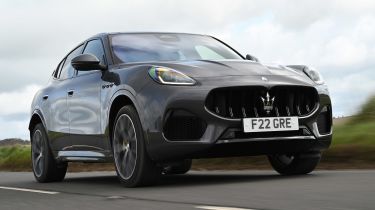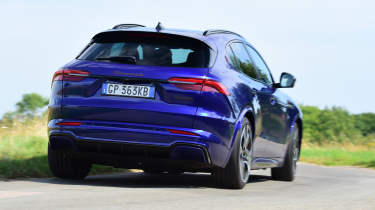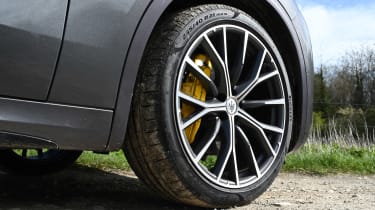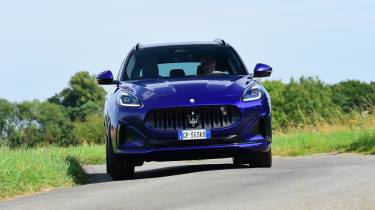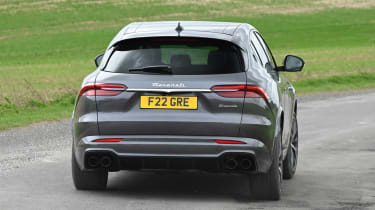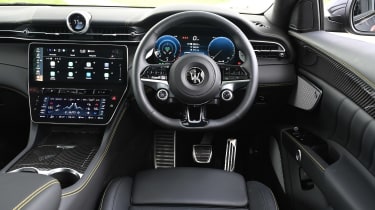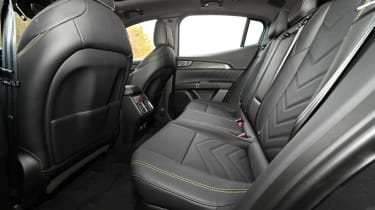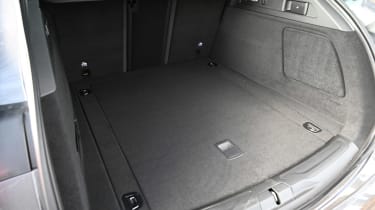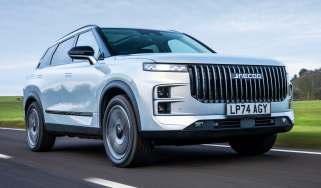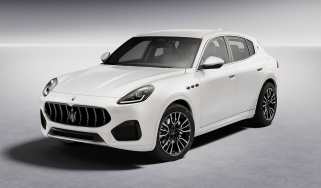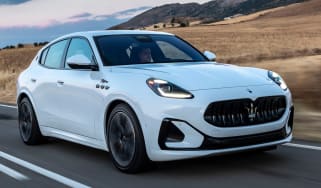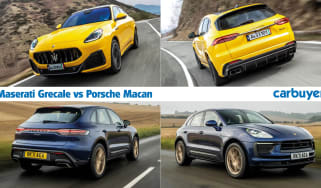Maserati Grecale review - Italy’s Porsche Macan rival
“Maserati’s long-awaited rival to the Porsche Macan is great in some respects, but its four-cylinder engines aren’t especially exciting”
Pros
- Good to drive
- Practical
- Well equipped
Cons
- Poor ride quality
- Droning engine
- Electric version is very expensive
Verdict – is the Maserati Grecale a good car?
For anyone looking for a characterful alternative to German performance SUVs, the Maserati Grecale makes a strong case for itself. Not only is it handsome on the outside, it’s also pleasingly upmarket and spacious for its occupants. The Maserati’s chassis is pretty comfortable over British tarmac, but the four-cylinder petrol engine in more affordable versions isn’t the last word in excitement. The all-electric Grecale Folgore may be the most powerful model, but it’s too heavy to feel particularly sporty, and it’s seriously pricey too.
Maserati Grecale models, specs and alternatives
Maserati would have benefitted from having a car like the Grecale on sale several years ago. It’s the Italian brand’s first attempt at a rival to the Porsche Macan, Jaguar F-Pace and BMW X3, so it competes in a popular sector of the market. The Porsche Macan is its maker’s most lucrative model, and Maserati’s owners will be hoping for similar success here.
There’s a hint of the Ford Puma from some angles (not ideal considering the Grecale costs significantly more), while the rear is reminiscent of the bigger Maserati Levante. There are some typical Maserati flourishes, though, like the trio of air vents on each front wing and a wide chrome-laden grille, complete with the iconic trident logo. Even the entry-level GT model gets four large exhaust pipes, hinting at the performance within, and every Grecale boasts muscular rear bodywork and attractive alloy wheels.
 Top 10 best sports and performance SUVs 2025
Top 10 best sports and performance SUVs 2025
The GT gets a four-cylinder engine with 296bhp and a little dollop of mild-hybrid electrical assistance. Mid-range Modena specification offers slightly more power (324bhp), while the range-topping Trofeo model uses the same 3.0-litre six-cylinder engine as the Maserati MC20 supercar. It’s good for 523bhp and a 0-62mph time of just 3.8 seconds.
There’s also an electric version, called the Grecale Folgore (Folgore means lightning in Italian). It’s the most powerful version with 550bhp, although that figure is down on its upcoming electric rival, the Porsche Macan Electric Turbo, which boasts up to 630bhp, and the Porsche is also lighter than the Grecale Folgore.
The Grecale Folgore doesn’t win back points for range – despite having a 5kWh larger battery pack than the upcoming Macan Turbo, the Grecale’s range is quoted at up to 310 miles, while the Porsche boasts up to 381 miles, and the Macan’s charging speeds are faster, too.
The Grecale sits on the same platform as the Alfa Romeo Stelvio, one of the best-driving SUVs in this class. And sure enough, the petrol versions are agile for a car this size, and there’s not too much body roll in corners. While the Grecale always feels reasonably firm riding, its adaptive suspension can be softened to improve comfort, even if you want maximum response from the engine and gearbox.
Despite boasting the loftiest power figures, the Grecale Folgore doesn’t feel particularly sporty to drive, though, and is better off seen as a luxury electric SUV, rather than a hot performance one. The Grecale Folgore’s chassis setup is also no match for the Porsche’s hi-tech system and fine-tuning.
The Grecale’s interior feels suitably premium; all the materials you come into contact with feel luxurious, and most of them are screwed together well, too. Further back, there’s a lot of space for rear-seat passengers and the 535-litre boot is certainly competitive with the class leaders.
Like most recent Maseratis, the Grecale isn’t quite good enough to beat its rivals in all areas, but it’s appealing and its badge and styling alone will be sufficient to sway some buyers. It feels more exotic than a BMW X3 or Audi Q5, and should quickly become the Italian brand’s biggest seller.
MPG, running costs & CO2
Performance will be of greater interest than efficiency for many Maserati Grecale buyers. But given Porsche no longer offers a diesel Macan, the benchmark is lower than it once was. Thanks to its mild-hybrid technology, the least powerful Grecale GT model manages up to 32.5mpg; no petrol Macan manages more than 28mpg according to official figures.
The much more powerful Grecale Trofeo returns up to 25.2mpg, until you explore the performance available.
The all-electric Grecale Folgore offers up to 310 miles of range, and when you need to top up, it can be charged at speeds of up to 150kW, meaning you can take it from 20-80% charge in 29 minutes. These figures aren’t class-leading by any means – the electric Porsche Macan Turbo can be charged from 10-80% in 21 minutes thanks to much faster 270kW charging, and it boasts a total range of up to 381 miles.
CO2 emissions for the GT are a bit less than the equivalent Porsche, only just scraping under 200g/km – although that’s largely meaningless as company-car buyers will pay the top rate of Benefit-in-Kind tax for both cars. The Grecale Folgore offers low tax costs and should boast the lowest running costs given its zero-emissions credentials, although it’s very expensive to buy in the first place.
Engines, drive & performance
The Maserati Grecale is based on a version of the same Giorgio underpinnings as the Alfa Romeo Giulia and Stelvio – both of which are very good to drive. The Grecale doesn’t feel quite as natural as the Stelvio, because while it’s very keen to dive into corners, it’s not quite as athletic as the steering first suggests. This fast steering also translates into a slightly nervous feel when cruising on faster roads.
For now, Grecale buyers have the choice of three petrol engines – a different one for each trim level. GT and Modena use a 2.0-litre four-cylinder engine with a small amount of electrical assistance, with 296bhp and 324bhp respectively. Both have the same torque figure. When we tested the 324bhp version, it sounded great for a four-cylinder, and we were glad that Maserati hadn’t tried to enhance the noise with obnoxious pops and bangs on the overrun, which is a trend for highly-tuned small engines.
Trofeo cars get the same twin-turbo 3.0-litre six-cylinder engine as the newly launched MC20 supercar, albeit with not quite as much power.
You still get 523bhp in the Grecale Trofeo, putting it squarely against the BMW X3 M Competition and Alfa Romeo Stelvio Quadrifoglio, while it significantly outguns the 434bhp Porsche Macan GTS. Straight-line pace is certainly strong enough, with its four-wheel drive and slick automatic gearbox helping the Trofeo reach 0-62mph in 3.8 seconds. With technology derived from Formula 1, there’s almost no turbo lag and the Grecale Trofeo feels incredibly urgent. Its soundtrack is a little gruff but natural, unlike the synthesised noise you find in some rivals.
Selecting Corsa mode loosens off some of the stability control, making the Trofeo feel playful and dynamic. Our first test drive was limited to roads on the outskirts of Milan city centre and on some city streets, but we’ve now also driven a Modena version on UK roads. The Trofeo is always firm, however, perhaps partly due to its 21-inch wheels. While based on the Stelvio Quadrifoglio, the range-topping Grecale feels like it’s been tuned with a slightly greater focus on luxury. The Modena was never harsh on British roads, however, even if you’re always aware of its sporting chassis. The adaptive suspension can be made softer independently of the car’s other settings, which is a welcome feature, and the Grecale is reasonably refined on the motorway.
We’re sure many buyers will be happy with the less expensive GT model, though, with its 5.6-second acceleration sprint. Maserati’s claim that the mild-hybrid tech makes the engine feel like a six-cylinder one doesn’t quite ring true; that said, despite being a humdrum 2.0-litre four-cylinder engine, it sounds rather good.
The GT weighs nearly 1.9 tonnes, and its sense of speed isn’t so strong at higher revs. It’s agile and has fast steering when driving a bit slower, but is happier to cruise at higher speeds. The Modena doesn’t feel a whole lot faster, but its throttle response is at least pretty sharp and the 450Nm of torque helps it get going from lower speeds with conviction. We also found the fake-sounding booms from the exhaust on upshifts a bit uncouth for such an upmarket SUV.
We’ve now driven the all-electric Maserati Grecale Folgore, which happens to be the most powerful version of the SUV, both on European roads and in the UK. Producing 542bhp and dispatching the 0-62mph sprint in just 4.1 seconds, it’s certainly no slouch, but in practice, it doesn’t feel quite as sporty as you might expect. The Folgore model is heavier than the upcoming Porsche Macan Turbo, and while that car gets a hi-tech chassis with lots of features to make the Macan feel agile, the Grecale Folgore does not, so it isn’t quite as dynamic.
The Grecale Folgore gets air suspension which is quite firm and makes some noise over rough surfaces as it keeps the Maserati’s 2.5-tonne mass in check. Surprisingly, we found that engaging sport mode made the Grecale Folgore ride better, as it was more settled and less bouncy with tightened dampers.
When you take it easier in the Grecale Folgore, you’ll notice the steering is light, despite its heavy weight, but the 21-inch wheels transmit a fair bit of vibration through the cabin over bumpy surfaces. Sound-proofing is pretty good, though, with only a faint whine from the electric motors when accelerating very hard.
Interior & comfort
Inside the Grecale the tech offering and high quality materials used do a good job of making sure the cabin feels special. We’d say, in fact, that the Grecale’s interior is its best feature.
The big news is that it doesn’t use a rebranded version of a Fiat or Jeep infotainment system; the new 12.3-inch touchscreen has a layout that’s easy to live with, with crisp graphics and quick responses through the easy-to-use interface. It is split into three large tiles which show functions such as media, phone contacts or driving functions which can be dragged and configured into various positions offering a high degree of customisation. Important features can be permanently found in a bar on the side of the display, so it’s always easy to access these. While both the Grecale’s and the Porsche Macan’s infotainment systems are crisp, we think the Grecale’s system actually feels a little more up-to-date and modern.
Connectivity is as good as the class leaders, with Android Auto, wireless Apple CarPlay, Amazon Alexa compatibility and online features like fuel price data and over-the-air (OTA) software updates. Below the main screen is an 8.8-inch panel that takes care of climate functions, which is a good move, but we do think also including the headlight controls here might be a step too far away from physical controls.
There’s also a 12.3-inch digital gauge cluster and a digital clock. The digital dials are also clear and display information in an attractive layout. As well as displaying the time, the clock can also be configured to show a compass or a G-meter reading.
The Grecale uses a very impressive selection of materials, with wooden trim, cool metal and soft leather. Build quality and the finish of the interior is generally good, and the parts of the car you touch on every trip like the steering wheel, leather front seats and metal paddle shifters all feel reassuringly expensive. Just like in a supercar, the Grecale’s start button and drive mode selectors can be found just under the spokes of the steering wheel – it’s a nice touch, which gives a sporty feel.
The Maserati Grecale comes with electronic door release buttons like you’ll find on many of the most recent premium cars. If we’re honest, though, these just seem completely pointless when every car with the feature has to come with a traditional mechanical failsafe to open the door below the button just in case the electronic system fails.
Three-zone climate control is standard, which means backseat passengers get their own temperature controls. As well as this, all cars get LED headlights, front and rear parking sensors, a reverse camera, leather upholstery and wireless smartphone charging.
We recommend specifying the optional Travel Pack – this costs around £500 but adds boot rails and a 230V power outlet in the back, making the luggage area even more versatile. Other than this, the Grecale’s optional extras will add a lot to the list price. The priciest is the Driver Assistant Pack Plus, which adds adaptive cruise control, active lane assist, blind-spot monitoring and matrix-LED headlights. You can also specify a premium Sonus sound-system, carbon-fibre interior trim, 21-inch alloy wheels and a panoramic sunroof.
You can even purchase the Grecale as part of Maserati’s ‘Fuoriserie’ customisation programme which allows buyers to spec almost any colour and decal option to truly create something one of a kind, but beware this costs an eye-watering £18,900 on top of the asking price.
Practicality & boot space
Sitting on a platform with a long wheelbase, the Grecale is a practical car. Maserati claims class-leading rear-seat space, and sure enough there is more than enough legroom, as well as a good amount of headroom and shoulder room. Adults should be more than happy to jump in the back, even on longer journeys. This is especially surprising given that the Grecale is shorter, narrower and wider than the Porsche Macan.
That doesn’t come at the expense of boot space, either. Mild-hybrid GT, Modena and fully-electric Folgore cars offer 535 litres of luggage capacity, while Trofeo models aren’t robbed of space from the batteries so boast 570 litres. The Porsche Macan Electric offers 458 litres, so it’s not quite as practical.
Reliability & safety
It’s too early to say how reliable or safe the Grecale will be, but you can specify a range of driver assistance systems that add up to Level 2 semi-autonomous driving capabilities. That should mean the Grecale, if equipped with these systems, will be able to adapt the speed of vehicles in front, stay within a lane and come to a stop automatically if required.
Maserati isn’t known for unblemished reliability, and there’s some new technology on board, but the familiar platform and Stellantis ownership should work in the Grecale’s favour. The Italian brand does have something of a mountain to climb in the UK, reputation-wise, which is made all the more difficult by its biggest rival Porsche coming top in our 2022 and 2023 Driver Power owner satisfaction surveys, before dropping slightly to fourth in 2024.
